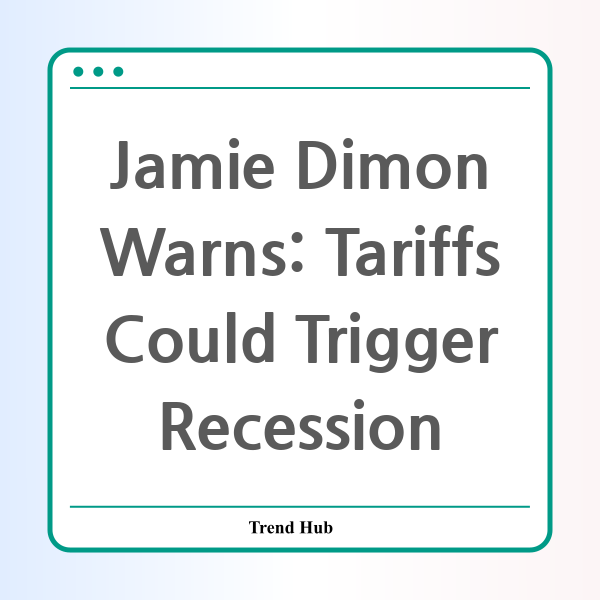* This website participates in the Amazon Affiliate Program and earns from qualifying purchases.

In a recent interview, Jamie Dimon, the CEO of JPMorgan Chase & Co., has raised alarm bells regarding the future trajectory of the U.S. economy under President Trump's tariff policies. Dimon noted that a potential recession is a "likely outcome" as tariffs create tumult in the financial markets, impacting investor sentiment and consumer confidence.
During his appearance on Fox Business’ "Mornings With Maria," Dimon expressed concerns over the ongoing trade war between the U.S. and China. He stated, "I think probably [a recession is] a likely outcome, because markets, I mean, when you see a 2000-point decline [in the Dow Jones Industrial Average], it sort of feeds on itself, doesn’t it?" This sharp decline in market values has implications for American households, as significant drops in stock prices can lead to diminished retirement savings and overall financial anxiety.
As the trade conflict escalates, uncertainty looms large on Wall Street. The tariffs imposed not only affect trade dynamics but also lead to fluctuations in bond yields and stock futures. Recently, forecasts suggest a mild recession may materialize even after a year of strong economic growth.
Dimon elaborated on how the current market conditions suggest that fears of recession are not unfounded. "Markets aren’t always right, but sometimes they are right," he remarked, underscoring the sentiment that financial markets are adjusting to heightened uncertainties at both macro and micro levels. This includes the impact on consumer sentiment, which could further exacerbate economic challenges.
Interestingly, Dimon has previously supported the notion of tariffs, suggesting that a slight increase in inflation could be justified if it bolstered U.S. manufacturing and national security. However, the severity and scope of the current tariffs have exceeded expectations, leading him to reassess their potential fallout. He cautions that such economic pressures not only threaten inflation but could also diminish America’s global standing.
Highlighting the interconnectedness of security and economics, Dimon warned, “Economic warfare has caused military warfare in the past.” He called for a diplomatic approach to trade, encouraging the U.S. to engage constructively with its trading partners. "Take a deep breath, negotiate some trade deals. That’s the best thing they can do," he advised. Without progress in negotiations, he fears that market responses could worsen.
In light of these pressing concerns, Dimon is not just vocal about economic implications but also stresses the importance of confirming strong leadership within the financial regulatory framework. He urged the Senate to confirm Federal Reserve Governor Michelle Bowman as vice chair for supervision, highlighting the necessity of capable oversight in a tumultuous economic environment.
The current geopolitical landscape presents a complex mix of challenges that Dimon describes as the "most perilous and complicated geopolitical and economic environment since World War II." As the tariff policies continue to unfold, the implications for the U.S. economy could be profound, with the potential for a recession looming on the horizon. Investors, consumers, and policymakers alike must stay vigilant and adaptable in navigating these turbulent waters.
* This website participates in the Amazon Affiliate Program and earns from qualifying purchases.